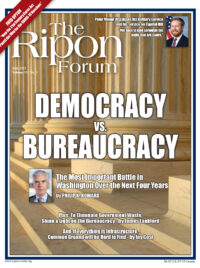… and Republicans should use process reform to tackle them.
Although fiscal austerity has been dismissed as “old-school” in recent years, history shows that the alternative—fiscal profligacy—brings dangers, which often manifest themselves years or even decades later. Rather than tempt fate, Republicans should rediscover their fiscally responsible heritage and develop modern policies to limit waste and reduce the risk of future financial calamity.
Under Democratic President Woodrow Wilson, the national debt ballooned from $3 billion in 1913 to $26 billion ahead of the 1920 Presidential election. Fed up with war, recession, tax increases, and government mismanagement under Wilson, voters gave Republicans a landslide victory in that election.
A major Republican reform enacted by the 67th Congress was the Budget and Accounting Act of 1921 – the successor to a bill vetoed by Wilson in 1920. This measure created what is now the Office of Management and Budget and the Government Accountability Office, implementing the annual budget process and centralizing federal auditing.
Republicans should rediscover their fiscally responsible heritage and develop modern policies to limit waste and reduce the risk of future financial calamity.
Better financial management and a strong economy led to a steep reduction in the national debt during the 1920s, but the residual debt limited federal fiscal flexibility at the outset of the Great Depression. By the early 1930s, interest on the debt consumed about 30% of federal revenues, crowding out other types of spending and acting as a barrier to tax reductions. Franklin Delano Roosevelt restored America’s fiscal flexibility through default: devaluing the dollar and denying Treasury bondholders the option to receive payment in gold.
Later in the 20th century, growing federal debt led to further disruptions. Debt monetization during World War II was suppressed through federal price controls, exacerbating shortages of many consumer goods. When the price controls were finally released, a short period of double-digit inflation followed.
After fiscal and price stability returned in the Eisenhower and Kennedy years, President Lyndon Johnson’s guns and butter budgeting spiked federal deficits and touched off an inflationary spiral that became especially pronounced during the 1970s. Federal Reserve Chairman Paul Volcker, with the support of President Reagan, greatly reduced inflationary pressure by sharply raising interest rates, triggering a deep recession in the early 1980s.
Unfortunately, some recent Republican leaders have lost touch with the party’s fiscally conservative legacy. President George W. Bush did not match tax cuts with spending reductions, while placing two armed conflicts and a Medicare prescription drug entitlement on the nation’s credit card. Under President Donald Trump, deficits were rising even before COVID-19 struck, despite a strong economy.
Today, we are in a situation that has some parallels to the early 20th century. We once again have a potentially crushing debt burden. The only reason that debt service is not crowding out other spending priorities is that interest rates are being held well below historical norms. To avoid the normalization of interest rates, the Federal Reserve is obliged to monetize federal debt thereby exacerbating inflation.
Although we do not know whether the rapid consumer price increases of recent months will continue, we do know that inflation in some form has remained with us even after the Volcker tightening. Instead of consumer goods registering steady price increases, inflation has continued to be an issue in education, healthcare, home prices and other asset valuations. So, despite CPI changes of 2% or less in most recent years, many costs have continued to escalate faster, and this price escalation is likely traceable to Federal Reserve accommodation of loose fiscal policy.
Further, the budgetary process established in 1921 has now broken down. In most years, the federal government operates on continuing resolutions, which largely amounts to keeping spending on autopilot irrespective of whether that spending produces worthwhile policy outcomes.
The large national debt inhibits the ability of future leaders to address major emergencies without increasing inflation, which destroys the savings of hardworking Americans.
Taxpayer money could be used more effectively if we had a functioning budgetary process in which elected officials are obligated to determine at regular intervals which expenditures are necessary and at what level. If annual spending reviews are no longer feasible, the federal government could follow the lead of several states by adopting biennial budgeting. Whether reviews occur every one or two years, they are most effective when appropriators are working under some sort of budgetary ceiling, compelling them to make hard trade-offs.
We normally think of that expenditure ceiling as total revenues, with the result being a balanced (operating) budget as we have in almost all states. Unfortunately, balancing the federal budget now seems beyond the realm of political feasibility, especially over the next two decades when the large Baby Boom generation makes peak use of federal entitlements.
But an annually balanced budget is not the only possible form of spending discipline. We could target a less ambitious goal such as stabilizing the nation’s Debt-to-GDP ratio, which is now near its all-time peak. Under this approach, the Congressional Budget Office would calculate a federal spending cap based on its forecast of GDP growth and federal revenues. Congress would not be able to appropriate more than the total of anticipated revenues plus the product of the national debt and anticipated GDP growth. This approach would require that all programs, including entitlements, to be subject to appropriation limits. Bringing Medicare and Social Security into the budgetary discussion might open the window to reforming these programs—a task that has eluded Congress for too long.
In 2021—as in 1921—federal budgetary processes are broken, and excessive debt burdens are being hoisted onto future generations. The large national debt inhibits the ability of future leaders to address major emergencies without increasing inflation, which destroys the savings of hardworking Americans. Republicans should respond to this moment by offering budgetary process reforms that restrain both wasteful spending and the growth of the national debt.
Marc Joffe is a senior policy analyst at Reason Foundation.





